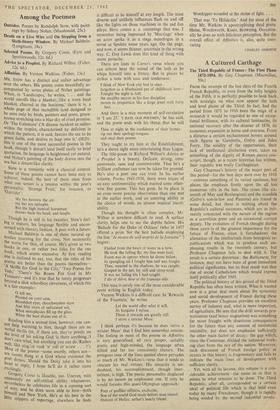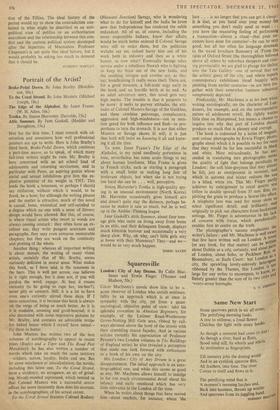A Cultured. Carthage
FROM the swamps of the last days of the Fourth French Republic, or even from the lofty heights of the Fifth, it is perfectly possible to look back with nostalgia on what now appear the lush and level plains of the Third. In fact, had the period from 1871 to 1910 been the reign of a monarch it would be regarded as one of excep- tional brilliance, with its cultural luminaries, its national recovery after the disaster of 1870, its economic expansion at home and overseas. From a distance a certain enchantment hovers around such figures as. Gambetta, Grevy and Jules Ferry. The solidity of the opportunists, their lack of intellectual distinction even, takes on something of the dignity of Roman patres con- scripti, though, as a recent historian has written, their republic was really Carthaginian.
Guy Chapman's history of the major part of this period—for the best days were over by 1910 —conveys something of its varied opulence, but places the emphasis firmly upon the all too numerous rifts in the lute. The crises (the six- teenth of May and Boulangism) and the scandals (Grevy's son-in-law and Panama) are traced in some detail, but there is nothing about the Republic's cultural successes, which are as inti- mately connected with the nature of the regime as a scurrilous press and an occasional corrupt deputy. The evolution of French thought during these years is of the greatest importance for the future of France, since it foreshadows the alienation of the intellectuals from bourgeois re- publicanism which was to produce such un- pleasing results in the twentieth century, but Professor Chapman fails to deal with , it. The result is a certain distortion : the Ralliement, for instance, may not have been of great immediate political significance, but its final result was that rise of social Catholicism which would express itself politically after 1945.
The political history of this period of the Third Republic has often been written. What is wanted now is a great deal more about the economic and social development of France during these years. Professor Chapman provides an excellent survey of industry and, what is more important, of agriculture. He sees that the drift towards pro- tectionism (and hence stagnation) was something far more fraught with disastrous consequences for the future than any amount of ministerial instability, but does' not emphasise sufficiently the other main factor of decay : the gap which, since the Commune, divided the industrial work- ing class from the rest of the nation. Moreover, such discussion of French foreign policy as occurs in this history is fragmentary and fails to indicate the main lines of development with sufficient clarity.
Yet, with all its lacunas, this volume is a con- siderable achievement—the more so in that it points to what remains to be done. The Third Republic, after all, corresponded to a certain ideal of political life which is that held even today by many Frenchmen, though it is rapidly being eroded by the second industrial revolu-
tion of the Fifties. The ideal history of the period would try to show the contradiction con- tained in what might be described as an anti- political view of politics or an authoritarian anarchism and the relationship between this con- flict and the curious political system developed after the departure of Macmahon. Professor Chapman's is not quite that ideal history, but it would probably be asking too much to demand that it should be.
AN IHON Y HARTLEY





























 Previous page
Previous page